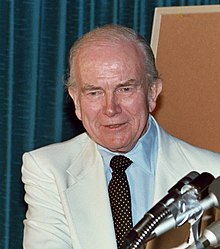Milton Caniff
Milton Arthur Paul Caniff (born February 28, 1907 in Hillsboro , Ohio , † April 3, 1988 in New York ) was an American comic book artist and author . His best-known works include the adventure strips Terry and the Pirates and Steve Canyon .
Live and act
In 1930 Caniff, who was already selling drawings to various newspapers while still a student, graduated from Ohio State University , Columbus . In 1932 he moved to New York , who had previously run a small studio with Noel Sickles , hired by the Associated Press and in the same year took over the Mr. Gilfeather series from Al Capp and continued it under the name The Gay Thirties . The following year he started his first own series, Dickie Dare . It was about a boy who initially had adventures in his imagination with Robin Hood , Robinson Crusoe and various other protagonists , but later went on a world tour and experienced various adventures himself.
Terry and the Pirates ' first strip , the adventures of a brave boy that made Caniff famous, appeared on October 22, 1934, the first Sunday on December 9, 1934. This series lasted until 1947 (it was published by other artists until 1973 continued), then he switched employers: from the Chicago Tribune-New York News Syndicate to the Chicago Sun-Times , where he had been offered a guarantee fee of 520,000 US dollars for the first five years . The move was commented on by Time as follows: " As if Henry Ford were leaving his factories to open a competing company across the street ." The following series about Navy pilot Steve Canyon , which was pre-contracted by 162 newspapers , first appeared on January 13, 1947. It was continued by Caniff until his death. In contrast to Terry and the Pirates , Caniff retained the rights to Steve Canyon . In total, Steve Canyon , whose last strip appeared on June 4, 1988, was reprinted in 450 newspapers. During the Second World War Caniff drew parallel to Terry and the Pirates first the series Burma , which was an offshoot of Terry and the Pirates . Since the rights holders did not agree with the offshoot, Caniff ended Burma and created the series Male Call , which, like Burma, appeared exclusively in soldiers' newspapers and for which he waived his fee. Male Call was discontinued in 1946. Like Terry and the Pirates , Steve Canyon was filmed as a television series.
Caniff, who initially wanted to be an actor, received the Reuben Award twice , in 1946, the first ever to be awarded, and in 1971. He was also awarded the Yellow Kid in Italy in 1978 . Caniff was inducted into the Will Eisner Award Hall of Fame in 1988.
Caniff died of lung cancer . His widow Esther only survived him by a few weeks and died on May 11, 1988, also at the age of 81.
According to Andreas C. Knigge, a special characteristic of Caniff was his expressionistic drawing style and his distinctive black and white technique. Author Rick Marshall called Caniff the "Rembrandt of Comic Strips". On the occasion of his death, a single picture based on Steve Cayon appeared in place of the Steve Canyon strip , drawn by Pulitzer Prize-winning Bill Mauldin and accompanied by the signature 78 colleagues, including Will Eisner , John Cullen Murphy and Dik Browne .
literature
- Franco Fossati: The large illustrated Ehapa comic lexicon . Ehapa Verlag , Stuttgart 1993, ISBN 3-7704-0865-9 , p. 48 .
- Andreas C. Knigge : Comic lexicon . Ullstein Verlag , Frankfurt am Main; Berlin 1988, ISBN 3-548-36554-X , pp. 128-129 .
- Andreas C. Knigge: 50 classic comics. From Lyonel Feininger to Art Spiegelman . Gerstenberg, Hildesheim 2004, ISBN 3-8067-2556-X , p. 72-77 .
Web links
- Literature by and about Milton Caniff in the catalog of the German National Library
- Milton Caniff at lambiek.net (engl.)
- Milton Caniff in the Internet Movie Database (English)
- Milton Caniff at comicguide.de
Individual evidence
- ↑ Milton Caniff at britannica.com , accessed December 9, 2008
- ^ Andreas C. Knigge : Comic-Lexikon . Ullstein Verlag, Frankfurt am Main; Berlin 1988, ISBN 3-548-36554-X , pp. 405 .
- ↑ a b c d Milton Caniff at comicbookdb.com (English) , accessed December 17, 2008
- ^ Andreas C. Knigge: Comics . Rowohlt Taschenbuch Verlag, Reinbek 1996, ISBN 3-499-16519-8 , pp. 89 .
- ↑ a b c Uwe Anton: Milton Caniff died . In: Andreas C. Knigge (Ed.): Comic Jahrbuch 1989 . Ullstein-Verlag, Frankfurt am Main; Berlin 1989, ISBN 3-548-36565-5 , pp. 365-366 .
- ^ Andreas C. Knigge : Comic-Lexikon . Ullstein Verlag , Frankfurt am Main; Berlin 1988, ISBN 3-548-36554-X , pp. 128-129 .
- ↑ Wolfgang J. Fuchs: 60 years of adventure trips . In: Andreas C. Knigge (Ed.): Comic Jahrbuch 1989 . Ullstein-Verlag, Frankfurt am Main; Berlin 1989, ISBN 3-548-36565-5 , pp. 143 .
| personal data | |
|---|---|
| SURNAME | Caniff, Milton |
| ALTERNATIVE NAMES | Caniff, Milton Arthur Paul |
| BRIEF DESCRIPTION | American comic book artist and writer |
| DATE OF BIRTH | February 28, 1907 |
| PLACE OF BIRTH | Hillsboro , Ohio |
| DATE OF DEATH | April 3, 1988 |
| Place of death | New York City |
